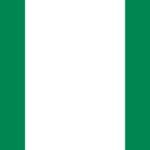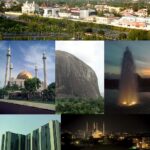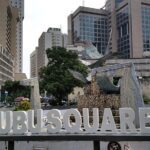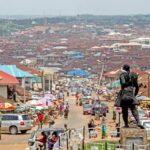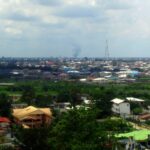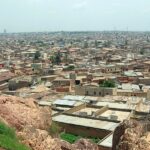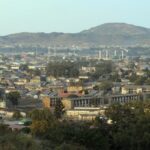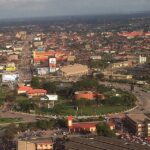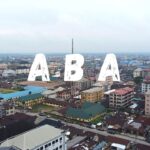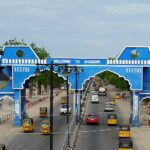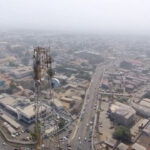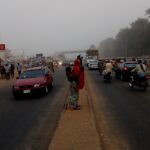Kaduna
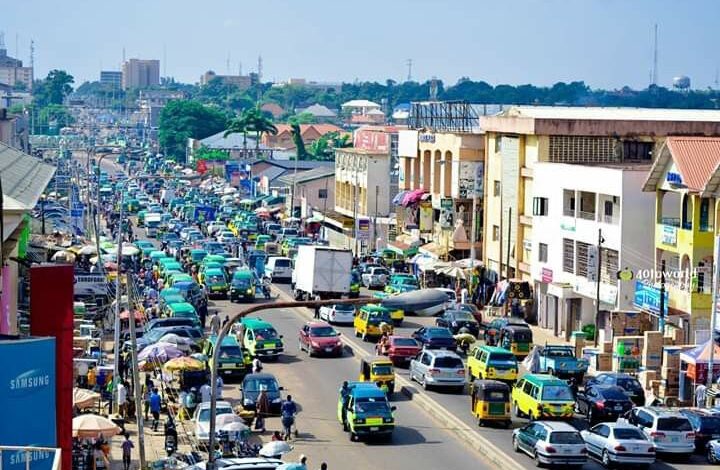
Kaduna, situated in north-central Nigeria, is the capital city of Kaduna state. It is positioned along the Kaduna River, a significant tributary of the Niger River.
In 1913, Sir Frederick (later Lord) Lugard, the inaugural British governor of Northern Nigeria, chose the current site along the Lagos-Kano Railway for the establishment of a town. Construction commenced, and by 1917, Kaduna, meaning “crocodiles” in Hausa, replaced Zungeru as the capital of the Northern Provinces, situated 100 miles (160 km) west-southwest. It also served as the capital of the Northern Region from 1954 to 1967. Lugard Hall, a legislative assembly building built in a simplified Islamic style, stands prominently at the head of the main street. The assassination of Sir Ahmadu Bello, the sardauna (sultan) of Sokoto and Northern premier, in Kaduna during an Igbo military coup in January 1966 played a pivotal role in triggering the Nigerian Civil War (1967–70).
Since the late 1950s, Kaduna has evolved into a significant industrial, commercial, and financial hub for the northern states of Nigeria. Most industries are concentrated south of the Kaduna River near the primary railway junction. The city hosts cotton-textile spinning and weaving mills, as well as the production of knit fabrics. The food industry manufactures beer, soft drinks, baked goods, and processed meat. Light manufacturing includes leather goods, plastics, ceramics, pharmaceuticals, furniture, and televisions. The city’s heavy industries produce steel and aluminium products, cement, asbestos cement, concrete blocks, electrical motors, ordnance, and explosives. Notable facilities include a steel-rolling plant, an automobile assembly factory, and an oil refinery supplied by a pipeline from the Niger Delta oil fields. A petrochemical plant commenced operations in the early 1980s. Kaduna is also a focal point for the construction industry and serves as a collection centre for various agricultural products, including cotton, peanuts (groundnuts), shea nuts, hides and skins, sorghum, millet, corn (maize), kola nuts, goats, poultry, and cattle.
Several educational institutions are based in Kaduna, including Kaduna Polytechnic College (1968), the Nigerian Defense Academy (1964), and Kaduna State University (2004). The city also hosts Christian teacher-training colleges. The Nigerian Geological Survey Agency has a research centre, along with a geology museum. The National Museum showcases exhibitions on the culture of the northern Nigerian states. Kaduna features a racecourse and the Ahmadu Bello Stadium (1964). Notable health institutions in the city include the Nigerian Institute for Trypanosomiasis (Sleeping Sickness) Research (1961) and the National Eye Centre.
Kaduna serves as a crucial transportation hub, with trunk railways from Lagos, Port Harcourt, and Zaria forming a junction in the southern part of the city. The Lagos-Kano highway also passes through Kaduna. The city is equipped with an airport located to the north. The estimated population was 1,375,000 in 2005 and approximately 1,685,000 in the urban agglomeration by 2016.
Map view
More about Kaduna from Wikipedia
| ID |
|---|
| 76966 |
| Name |
| Kaduna |
| State ID |
| 294 |
| State Code |
| KD |
| State Name |
| Kaduna |
| Country ID |
| 161 |
| Country Code |
| NG |
| Country Name |
| Nigeria |
| Latitude |
| 10.52641000 |
| Longitude |
| 7.43879000 |
| WikiData ID |
| Q208318 |
Kaduna is the capital city of Kaduna State, and the former political capital of Northern Nigeria. It is located in north-western Nigeria, on the Kaduna River. It is a trade center and a major transportation hub as the gateway to northern states of Nigeria, with its rail and important road network.
The population of Kaduna was put at 760,084 as of the 2006 Nigerian census. Rapid urbanization since 2005 has created an increasingly large population, and as of 2024, the city has an estimated population of 1.2 million people.
Etymology
The word Kaduna is said to be a corruption of the Hausa word for "crocodiles", Kaddunna in the Hausa language (kaduna being the plural form). Another version of the etymology of the name proposes a link to the Gbagyi word/name 'Odna', meaning 'river'.
History
Kaduna was founded by British colonists in 1900. The first British governor of Northern Nigeria, Sir Frederick Lugard, chose the present site for development due to its proximity to the Lagos-Kano Railway. It became the capital of Nigeria's former Northern Region in 1917, and retained this status until 1967. The city is still influential as the headquarters of various political, military and cultural organizations, especially in Northern Nigeria.
In 1976, when the General Murtala Mohammed administration created seven new states in Nigeria, North Central State, with capital at Kaduna, was renamed Kaduna State. It was made up of the two colonial period Provinces of Zaria and Katsina. When in 1991, the number of states in the country was increased from twenty-one to thirty, Katsina Province became Katsina State, while the old Zaria Province became the new Kaduna State. There are twenty-three local government areas (LGAs) in the state, although the number of ethnic groups is much larger.
Economy
Industries
Kaduna is a major industrial center in Northern Nigeria, manufacturing products like textiles, machinery, steel, aluminum, petroleum products and bearings. However, the textile industry has been in decline due to recent Chinese imports and factory closures caused by years of neglect across many administrations. Other light manufactures include: plastics, pharmaceuticals, leather goods, furniture, and televisions. Agriculture is also a major industry in Kaduna, and as such, the Bank of Agriculture has its headquarters in the city. Some main agricultural exports include: cotton, peanuts, sorghum, and ginger. Kaduna also has a branch of the Nigerian Stock Exchange. Automobile manufacturing also remains an important part of Kaduna's economy. Peugeot Automobiles Nigeria has an assembly plant in Kaduna. Kaduna Refining and Petrochemical Company (KRPC), one of Nigeria's four main oil refineries is located in Kaduna. It is supplied by a pipeline from the Niger Delta oil fields.
A 2009 World Bank survey states that Kaduna is one of the top six cities with the highest unemployment. 20% of the population was estimated to be unemployed.
Sports and tourism
There is a large racecourse named Murtala Mohammed Square, approximately 1.6 kilometres (1 mi) in perimeter, inside which is found the Kaduna Polo Club. Kaduna Golf Club is also located within the Kaduna CBD. Other sports facilities include the Ahmadu Bello Stadium and Ranchers Bees Stadium. The city boasts of several tourist attractions some of which are:
- Kaduna National Museum
- Jaji Military Cantonment
- Kajur Castle
Infrastructure
The infrastructure network in the city was upgraded by the administration of Governor Nasir el-Rufai with an underpass, flyover structures and streetlight facilities. Kaduna has an inland dry port. The Nigerian military has several formations and institutions in the city including the Nigerian Defence Academy, and the Air Force Institute of Technology.
Airport
The city is served by Kaduna International Airport. The airport commenced operations in 1982. The Nigerian Air Force maintains a presence in the city.
Railways
Kaduna is also on the route of the planned Lagos–Kano Standard Gauge Railway, which has been completed between the national capital of Abuja and Kaduna. Trains for Abuja depart from the Rigasa Railway Station in Kaduna. Kaduna is an important junction on Nigeria's Cape gauge railway network. At Kaduna, a branch line connects the Lagos–Nguru Railway to the Port Harcourt–Maiduguri railway.
Education
Kaduna is popularly known as the centre of learning, as evident from the numerous educational institutions located in the state. Tertiary Institutions in Kaduna city include:
- Kaduna State University
- Nigerian Defence Academy (NDA), Kaduna
- Greenfield University Kaduna
- National Open University of Nigeria, Kaduna Study Center
- Air Force Institute of Technology, Kaduna
- National Teachers Institute (NTI), Kaduna
- School of Midwifery Kaduna
- Kaduna Polytechnic (1968), Kaduna
- National board for Islamic and Arabic studies
- Kaduna Business School
- Dialogue Institute Kaduna
- Institute of Ophthalmology, National Eye Centre, Kaduna.
Administrative Areas
Administration of the state started with the concept of Provincial Administration and Native/Local Authority systems. However, in 1976 the Mohammed Administration introduced the Local Government Area system (LGA) which delegated some responsibilities to the elected/appointed councillors. With each successive Federal Military Administration, the number of the LGAs in Kaduna State increased from fourteen in the early 1980s to the present twenty-three in 1998. In each LGA, smaller units such as districts and wards, are recognised.
Places of worship
Among the places of worship, there are churches and mosques. Sultan Bello Mosque is the biggest and a central mosque in Kaduna. There are also churches: Church of Nigeria (Anglican Communion), Presbyterian Church of Nigeria (World Communion of Reformed Churches), Nigerian Baptist Convention (Baptist World Alliance), Living Faith Church Worldwide, Redeemed Christian Church of God, Assemblies of God, Roman Catholic Archdiocese of Kaduna (Catholic Church), Mountain of Fire and Miracles Ministries, Universal Reformed Christian Church (Protestant Church).
Climate
Notable people
See also
- Railway stations in Nigeria
- Kaduna State
- National Ear Care Centre
References
External links
Media related to Kaduna at Wikimedia Commons
References
- http://www.nigerianstat.gov.ng/nbsapps/Connections/Pop2006.pdf
- http://www.dwd.de/DWD/klima/beratung/ak/ak_650190_kt.pdf
- http://www.dailytrust.com.ng/news/general/a-memorable-trip-on-the-abuja-kaduna-train/156469.html
- https://citiesintransition.net/fct-cities/kaduna/
- https://www.britannica.com/place/Kaduna-Nigeria
- https://www.nytimes.com/2010/01/17/world/africa/17abdulmutallab.html
- https://web.archive.org/web/20120305101910/http://www.nigerianstat.gov.ng/nbsapps/Connections/Pop2006.pdf
- http://kadunainlanddryport.net/
- https://www.peugeotnigeria.com/
- https://www.nnpcgroup.com/Refining/Pages/KRPC.aspx
